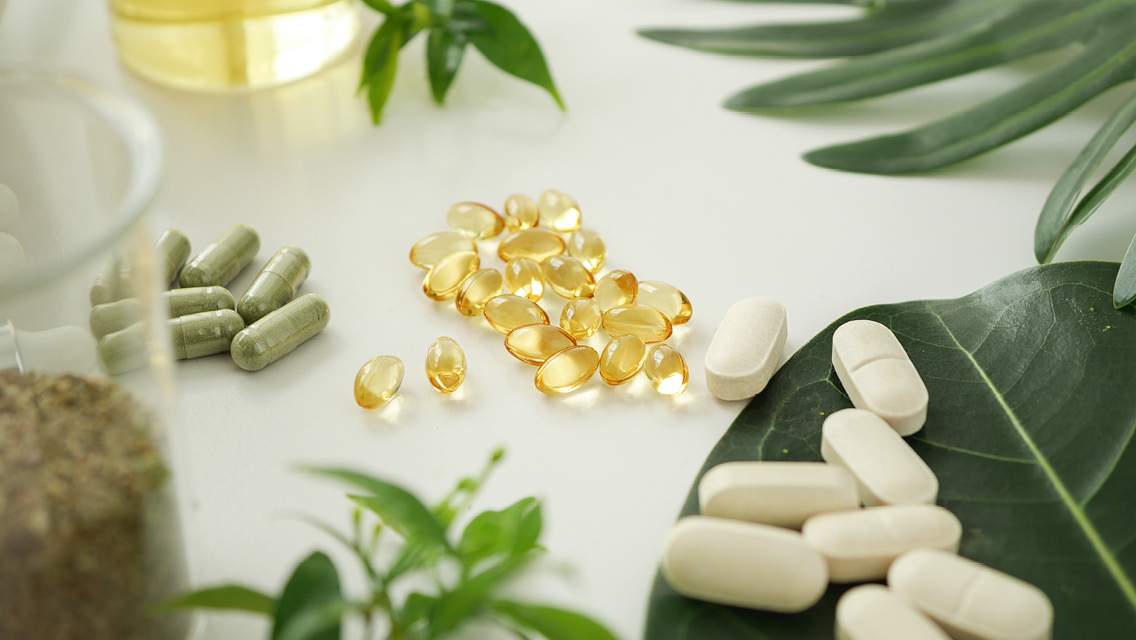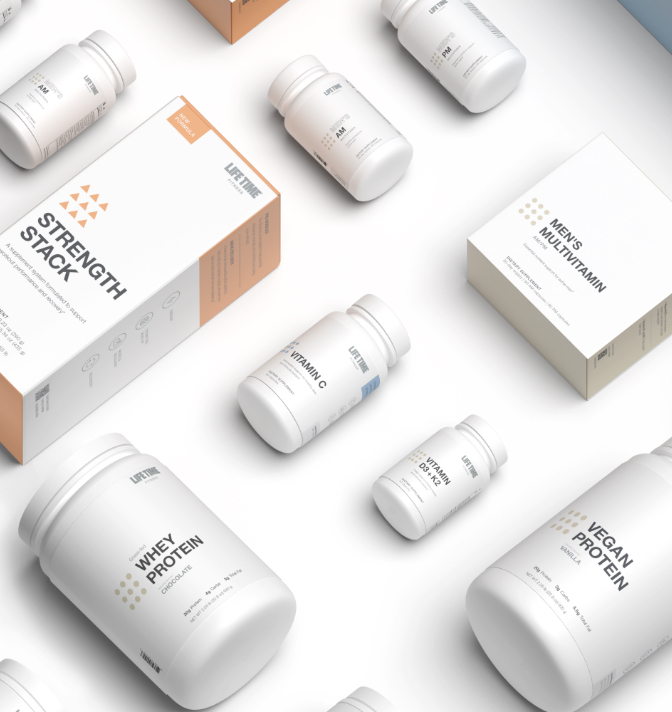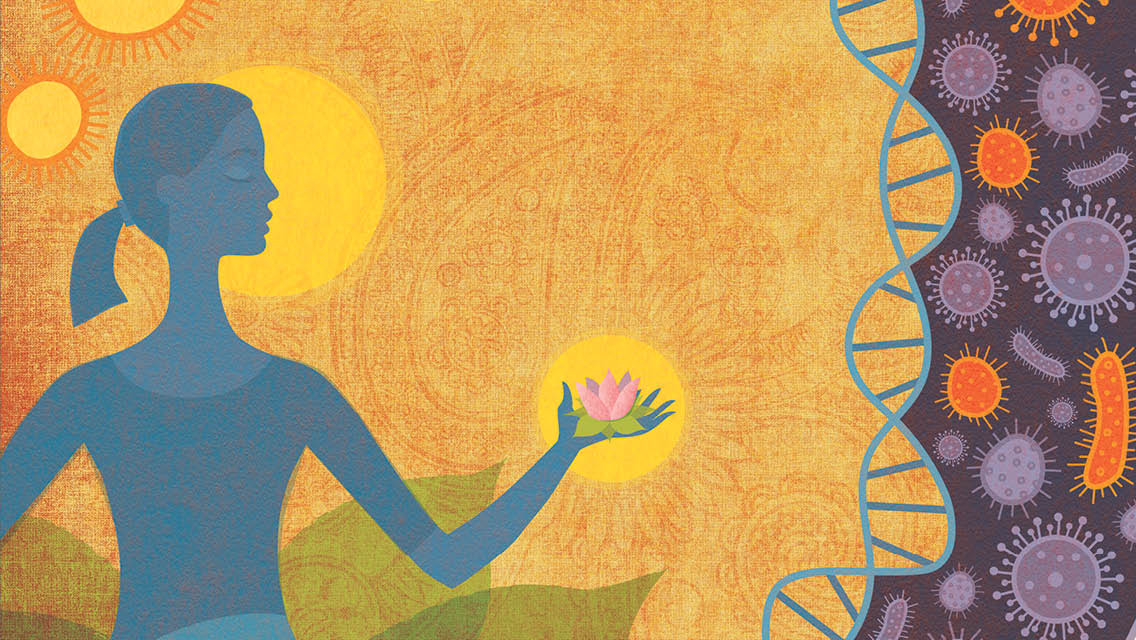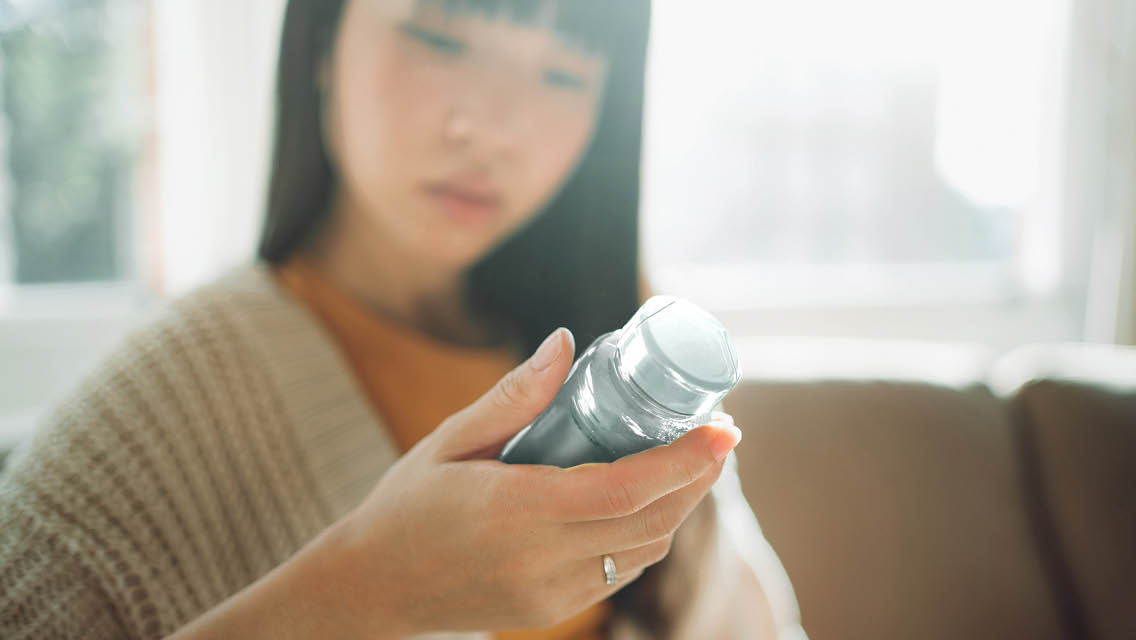ARTICLE SHORTCUTS
Diet and Nutrition | NAC | Vitamin D | Resveratrol | Intermittent Fasting | Probiotics | Melatonin | Quercetin | Other Herbs and Supplements
A root-cause approach is helping many long-haulers when a symptoms-based one might not. The following is an overview of the specific strategies functional-medicine providers are using to help these patients tackle their symptoms.
Each case has different precursors, and not all long-haulers will have the same outcomes with the same treatments, but these may help.
1. Diet and Nutrition
A food-first approach is the bedrock of integrative treatment. “Diet can be a source of inflammation, and whatever we can do to lower [inflammation] will allow the immune system to work better,” says Elizabeth Boham, MD, MS, RD, a functional-medicine physician and medical director at the UltraWellness Center in Lenox, Mass. She recommends her patients limit their intake of refined carbohydrates and focus on whole foods rich in protein, fiber, healthy fats, and the micronutrients the immune system needs to thrive.
Supporting a good nutrient baseline is also key. “We see a significant amount of nutrient deficiencies and insufficiencies in the United States,” Boham says. Notably, insufficient levels of zinc and selenium are associated with worse outcomes from viral infections. Good sources of zinc include oysters, hemp seeds and pumpkin seeds, beans, nuts, and animal protein; sources of selenium include mushrooms, Brazil nuts, and seafood.
“Make sure you’re getting eight to 12 servings of phytonutrients a day from vegetables, fruits, spices, herbs, and tea,” she advises. Phytonutrients such as EGCG (epigallocatechin gallate, a polyphenol found in green tea) and curcumin (found in turmeric) can decrease inflammation and rebalance the immune system.
(For more on nutrition and immunity, see “Nutritional Support for Your Immune System“.)
2. N-Acetyl-L-Cysteine (NAC)
NAC is an amino acid that the body uses to create glutathione, the body’s master detoxifier. “Glutathione has a big impact on balancing the immune system,” explains Boham. “If we’re deficient in it, we’re more likely to get sick, and also to have a continued immune response.”
Eating plenty of cruciferous vegetables (such as kale, broccoli, and cabbage), as well as avocado, okra, spinach, and alliums, can help bolster levels of glutathione, as can supplementing with NAC. (For more on glutathione, see “Glutathione: The Great Protector“.)
Aaron Hartman, MD, founder of the Richmond Integrative and Functional Medicine clinic in Richmond, Va., describes one patient, a 26-year-old woman, whose symptoms — persistent low oxygen and shortness of breath — following a bout of COVID resolved after treatment that included NAC as well as omega-3 fish oil.
“NAC is one of the more important nutrients for people who get shortness of breath with COVID, because of its ability to break down those really, really small blood clots called micro-emboli,” explains Hartman.
3. Vitamin D
Much has been written about the emerging link between COVID severity and vitamin-D deficiency. A pilot study in Spain found that adding oral D3 supplementation significantly reduced the need for ICU treatment among people hospitalized after infection. And Galland notes that D is an important promoter of ACE-2 activity.
He recommends that people with long COVID supplement with up to 5,000 IU of D3 daily. Hartman advises aiming for a vitamin-D blood level in the range of 60 to 80 ng/mL.
(For more on vitamin D, see “Vitamin D: What You Need to Know“.)
4. Resveratrol
Resveratrol is a polyphenol with antioxidant and anti-inflammatory effects that’s found in red grapes, red wine, peanuts, and some berries. It’s also available as a supplement.
Leo Galland, MD, a functional-medicine internist in New York City, has found it to be particularly helpful in restoring his COVID patients to health. “Resveratrol has a number of beneficial effects on coronavirus infection,” he notes. “It supports ACE-2 function, it inhibits the growth of the deadly MERS coronavirus through multiple mechanisms, and it diminishes the kind of inflammation associated with coronavirus infection.”
Galland treated a physician in her 60s who’d been sick with COVID for six weeks, continuing to run daily fevers with brain fog and fatigue. He prescribed a combination of herbs and supplements, including resveratrol, and her symptoms resolved within a couple of weeks.
He recommends long-COVID patients supplement with 200 mg of resveratrol twice a day.
5. Intermittent Fasting
Some functional providers believe intermittent fasting or time-restricted eating can help rejuvenate the immune system. Restricting feeding to shortened windows helps stimulate mitophagy (the removal of damaged mitochondria), explains Patrick Hanaway, MD, senior advisor to the CEO of the Institute for Functional Medicine.
Fasting also supports the turnover of damaged cells throughout the body, making room for new, healthy mitochondria and cells to take their place.
Time-restricted eating can take a variety of forms. One of the most popular is simply eating all your day’s meals within an eight-hour window, then going 16 hours without food or calories.
(For more on this protocol, see “Everything You Need to Know About Intermittent Fasting“.)
6. Probiotics
COVID can wreak havoc on the gut microbiome, but research on specific probiotic strains that can best restore balance following the syndrome’s particular damage is in its infancy. Galland is looking into soil-derived bacteria of the genus Bacillus because it may have natural antibiotic properties, though there’s not yet enough data to make specific recommendations.
Eating fermented foods, such as sauerkraut, yogurt, kefir, and kimchi, can help fortify and support the gut’s microbiome. And in the event of ongoing gut disturbances, working with a functional-medicine provider to design a well-rounded prebiotic and probiotic protocol can help bring the microbiome back into balance.
(See “Everything You Need to Know About Probiotics” for expert advice on common questions about probiotics.)
7. Melatonin
Melatonin is an anti-inflammatory and antioxidant chemical our bodies produce to help regulate the sleep–wake cycle. It also supports the gut lining, which promotes healthy immune function.
Supplementing with 1 mg of melatonin at bedtime might benefit those whose sleep–wake cycles have become dysregulated with long COVID.
8. Quercetin
Quercetin is a flavonoid found in dill, broccoli, onions, capers, apples, and berries. “Quercetin is a mast-cell stabilizer,” says Boham. “We use it with people who have allergies, asthma, and mast-cell issues.” (Mast cells, a type of white blood cell found in connective tissue throughout the body, produce allergy-related symptoms and can also be activated by SARS-CoV-2 infection.)
Quercetin appears to bind to the spike protein of the coronavirus, inhibit inflammatory pathways, and block replication of infected cells. It is also antiviral and completely safe, she adds.
In addition to emphasizing sources of quercetin in their diet, Boham says, long-COVID patients can supplement with 500 mg twice a day.
9. Other Herbs and Supplements
Galland has found three herbs especially useful in helping COVID patients: astragalus, Chinese skullcap (Scutellaria baicalensis), and andrographis. Astragalus and Chinese skullcap may help compensate for loss of ACE-2 by performing some of its functions; andrographis can help prevent the virus from entering cells by inhibiting an enzyme called furin.
Dosages depend on preparation, so work with a functional-medicine provider or herbalist to find the right dose.
Other tools for treating postviral inflammation can include trace minerals, omega-3 fish oils, ECGC (the compound found in green tea), and the antioxidant CoQ10. Dietary and lifestyle interventions, such as emphasizing sleep, managing stress, and mitigating environmental irritations (for instance, by using HEPA filters) can also help.
This was excerpted from “How to Treat Long-Haul COVID” which was published in the April 2021 issue of Experience Life magazine.






This Post Has 5 Comments
[…] Read More » […]
Thank you for the informative, evidence-based info on these supplements/herbs. My significant other was just admitted to the hospital with a breakthrough infection. We were already supplementing with some of these as recommendations for post-stroke fatigue–a very real and serious problem for stroke-sufferers and their families. Any other info available regarding functional medicine strategies helpful in treating that syndrome?
[…] […]
[…] […]
[…] 9 Functional-Medicine Strategies to Help Treat Long-Haul COVID […]